She wakes at 4:30. We’re already late. Amid the ineffable silence of early dawn, she ties two pink bows into her hair and prepares her family’s lunches. We pull into the dimly lit student parking lot at 5:55 a.m. Shuffling fifteen-odd jangling keys, she opens the gates. She leads us into the supply room — we’ve never been here before. With a flashlight, we begin the journey.
The process is slow. We trudge through each hallway of each building, wincing as she turns on the lights. The darkness is overwhelming. “I bring my husband sometimes,” she says, “if I’m alone, if it’s too dark.” Once the lights are on, she takes us to the basement. The mop heads are thrown from the washing machine to the dryer. The sun starts to rise now — she drags two blue recycling bins, each bigger than herself, out by the dumpsters. She scrubs with a faded yellow broom until the hose water runs black from the bins.
We yawn. We’re exhausted before the first bell, we tell her.
Yuritza giggles, calls us cute. “The day hasn’t started yet.”
Who are the janitors? In theory, it’s a simple question. They clean our school. They pick up our trash, collect our trash bins, and then take out our trash. They scrub the staircases we stomp on. They paint over our graffiti on the cafeteria walls. Every time we throw the laminated “It’s Covid! Wash your hands” sign into the toilet and flush it, they clean up the flood of sewage water with their industrial mops.
And we aren’t oblivious. Our mess doesn’t magically disappear. But beyond the detergent soaps and navy blue uniform, could you actually name any of the 13 people that put our health before theirs in the middle of a pandemic?
We didn’t even know there were 13. We thought there were only two.
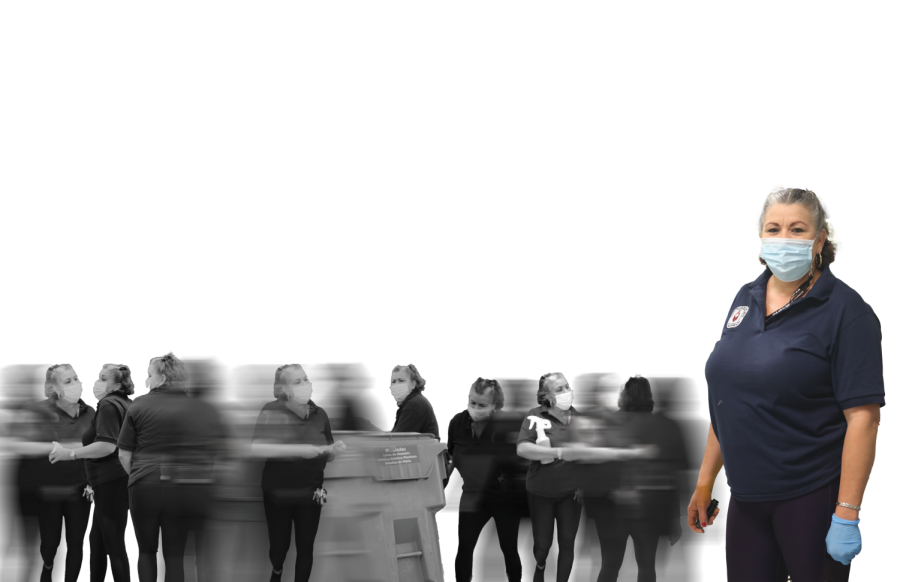
Anyways, it serves us right that the custodians ignored us for two weeks before we could sit them down for an interview.
When we saw the Head Custodian, Oscar Gonzales, drive his golf cart across the soccer field, we ran to catch up (literally chasing him.) We were told repeatedly that the language barrier between us and the janitors was too thick and that we would not be able to easily communicate with them. But that wasn’t the problem. The problem was that they all said no.
At least, until we met custodian Yuritza Hernandez in the middle of a band hallway and asked her if she liked her job.
“The students and staff are nice to me,” she says. She takes her blue latex gloves off and sits on the ground next to us. “I like my job. A lot.”
We share a side-eyed glance. She enjoys her job? We didn’t expect that answer. Especially when she explains the cafeteria situation.
“So maybe two weeks ago, one kid painted my wall. I come in during lunch time and I say, ‘Oh my god.’ Two or three days [it was painted,] the first time it’s [in] black. Two or three days next — same because it’s the boys’ bathroom — painted white on the wall. I said, ‘Oh my god, no, please.’”
Even though she went to school administration for help, the boy was not caught. She tells us this happens all the time. The next morning, she shows us her painting skills on the cafeteria bathroom walls.
“See, I painted here and here,” pointing to tinted splotches of paint. For such a laborious task, Yuritza smiles. There is an odd sense of accomplishment in the boys bathroom at 6:10 a.m.
Following each eight-hour shift, Yuritza goes home to handle her second job of being a mother. She cooks every meal for her family of four, and continues to clean while at home. Pulling out her phone, she proudly shows off her daughter.
“So my daughter, before, she’d say, ‘I know mom, but I don’t understand how custodians work until you work as a custodian.’ Because I explain what we do every day.”
She sighs.
“So now she tells me, ‘Mom, I have a concern because you are coming and my leg pain, my hip pain, my back pain,’ so if the students know how hard we work, maybe they help more.”
Throughout our conversations with Yuritza, she would bend over to pick up leftover garbage from the day before. Gathering the remnants of a shredded sandwich, she giggles, blaming a raccoon.
We share another side-eyed glance.
It was not a raccoon.
But we join her and pick up the remaining lunchbox contents. There’s an immediate sense of guilt for our classmates’ actions that are now so unavoidably present. How could we not want to help?
While she talks, Yuritza consistently hesitates.
“I don’t know if you understand me because I don’t speak much English but …”
We understand perfectly.
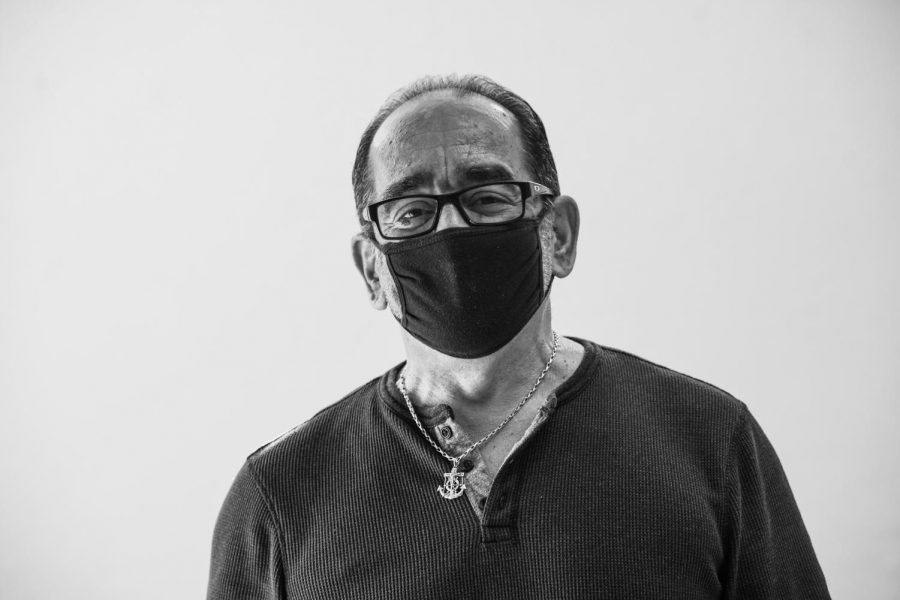
Once our AP U.S History teacher Katie Sheridan heard about our story, she excitedly introduced us to her “good friend” Gilbert Colon, the Building 3 custodian.
When we meet him, he’s wearing a New York Yankees mask and a navy blue shirt. We make sure we’re not interrupting his work. He shakes his head, eager to be interviewed.
“I wait for all of you to go back to class, and then start all over again. Every time your bell rings, I go into the bathroom, wipe all the doorknobs. Then I go and do it again in two hours, and then in another two hours.”
He wipes his forehead of sweat.
Gilbert tells us he enjoys the cleanliness of his job, and how it affects him beyond the school gates.
“My wife says I got OCD so everything I do has to be perfect. My wife’s half of the closet is all messed up, but mine is color coordinated.”
Laughing it off, he finds fault from the underappreciation of our friends.
“Ehh, not really appreciated,” he pauses. “Not really. They just go by — by the end of the day, you see things that shouldn’t be done. Like writing on the tables, sticking gum under the tables, just throwing things on the floor instead of taking it to the nearest garbage can.”
It’s a starkly different answer from when we talked to Yuritza.
“I know they wouldn’t do it at their home, so why would they do it here?”
Unlike the students, Gilbert has a different connection to the teachers in Building 3 — like Ms. Sheridan.
“They love me and I love them,” he says.
When Ms. Sheridan lets us skip class for this interview, we don’t doubt it.
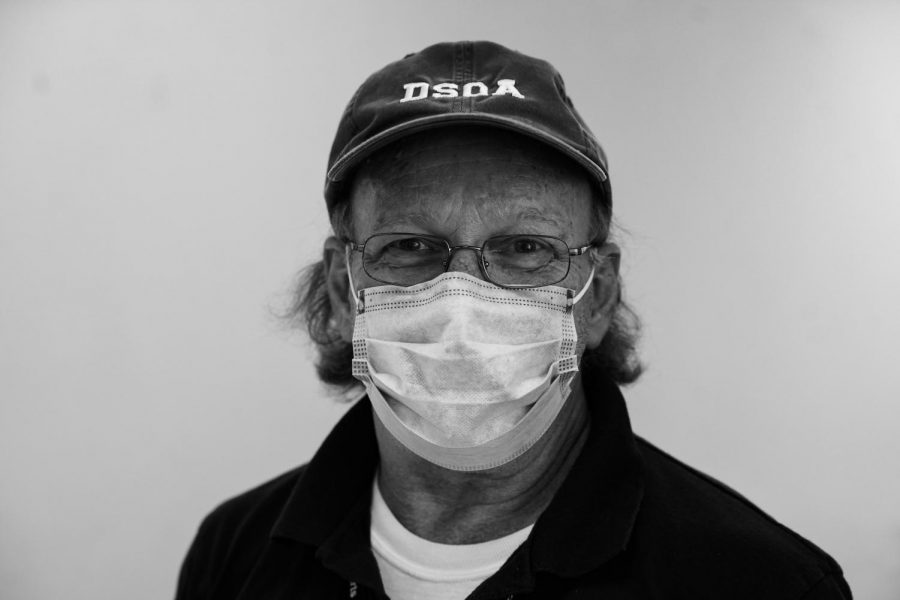
The big yellow mop buckets now became our leading clue for scouting the janitors. Carefully listening to the faint jangle of keys, we find Tucker scrubbing the staircase railing on the fourth floor of Building 1.
Ralston Tucker, whom most everyone calls Tucker (well, those who know his name), tells us his backstory. Originally from Kingston, Jamaica, Tucker moved to Florida in 1978. We immediately share a bond over breadfruit and soccer. Within minutes, the interview transitions into more of a conversation.
“I’m glad you guys came to talk to me. Some kids, they walk by and pretend not to see me.”
Tucker is lonely.
“I don’t know if it’s my color,” he says, “but it’s like I’m invisible.”
We tell him the goal of this story is to end that feeling of being unseen and unheard. However, it’s here we also learn that this story won’t change the system that allocates tens of millions of dollars to coronavirus relief and extra cleaning supplies, but only raises the custodians’ annual salary from $24,900 to $25,200, a mere 1.01 percent raise. Our intentions aren’t to give them an increase of pay — although that would be nice, Superintendent Donald E. Fennoy.
Truly, our intentions are to end this layer of invisibility that stretches from the mop to our student body.
“One girl asked me if I needed help,” Tucker laughs. “I told her, ‘No sweetheart … But thank you.’”
He tells us he thought about her for the rest of the week.
Tucker also tells us about the anonymous girl who threw his COVID-19 sign he hung up in the restroom, into the toilet. Numerous times. For numerous weeks.
Throughout each frustrating story, we get more and more uncomfortable. His eyes, glossy from previous eye surgeries, hide the feelings of 20 years of neglect, but also hold unwavering dedication.
“I still love everyone and will continue to do my job with love,” he says, “even if they don’t love me back.”
He interrupts our next question. “Guess my age.”
Huh?
“Guess my age. Go on.”
We smile and stutter. No one has asked us this question before, especially in an interview. We go with 45.
He’s 71.
He tells us he only eats fish — he jokes it’s a secret to looking young. Tucker continues to share memories from on the road, touring with his reggae band around the country.
We’re in shock. Actively touring in a band is definitely not what we expected. He amazed us. It leaves us wondering how many stories like this exist and are left unheard.
When we turn to leave, he asks us to breach the COVID-19 restrictions and give him a hug. “I really appreciate this. I’m here always, whenever.”
On the fourth floor of Building 1, he returns to scrubbing the staircase railings. This time, with a smile.
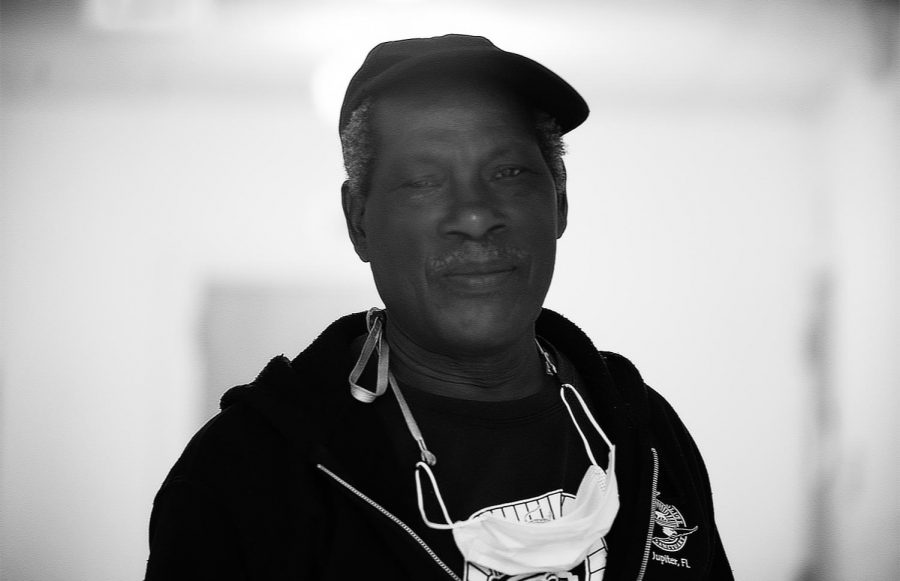
Custodian Jim Frampton really likes to recycle. He titles himself an avid recycler.
“It’s vital that the whole world recycles,” he says. Jim further explains to us his dedication, putting a recycling bin for plastic and paper in each room of Building 4, which covers both the dance and science departments.
We ask him to contextualize the passion.
“Oh man, are you kidding me?” He sits up.“Global warming, the fact that landfills are overflowing … it’s really the way to go to keep the planet alive.”
Like Gilbert, Jim also has a unique bond with the teachers of Building 4. He tells us he often trades eco-conscious documentaries with AP Environmental Science teacher Elyce Ashbee Hill.
As passionate as he is in regards to saving our planet and campus, he doesn’t see the link between his work dedication and his income.
“If I made enough money, I wouldn’t have to worry about my mortgage. We barely make over minimum wage. If I could enjoy my life more, maybe I could enjoy my job more.”
Despite this, Jim digs through the garbage every day, separating recyclable items from the trash. The extra work doesn’t bother him.
His heartfelt devotion overcomes the meager pay.
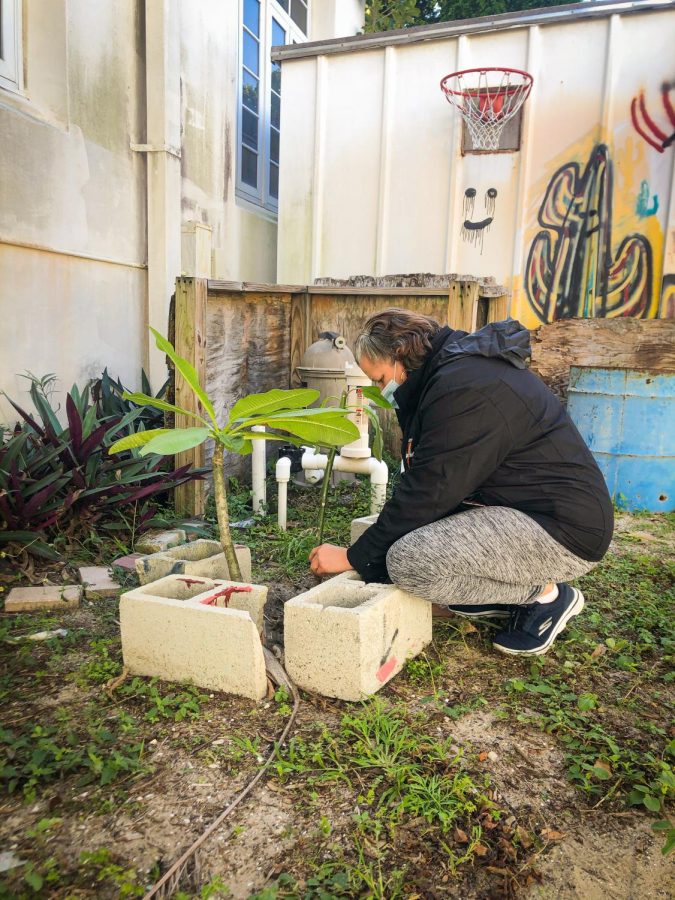
The sun has now fully risen and the water from the blue bins that Yuritza scrubs begins to run clear. She tells us that we’re the first people to be interested in her job. We tell her that will change.
“I hope,” she responds.
We pile into her golf cart and ride up to the front of the school. She stops in front of flowers. She points at the budding orchids.
“I planted these. I have 30 more at home.”
In some of the pots, the soil is freshly turned. We tell Yuritza they’re beautiful. Not just the flowers themselves, but the action of nurturing life in filth. Behind them, she picks up pieces of trash. We turn to help.
“They’re my favorite flowers,” she says, bending down to smell a growing bud. She tells us how she thinks they make the campus pretty. It’s a serene moment to have before our classmates flood the student parking lot.
Yuritza’s legacy of these obscure orchids is peculiar and unnoticed. And if there’s one thing we learned from the invisible, it’s that the orchids will bloom, even if we’re the only ones to see.
























































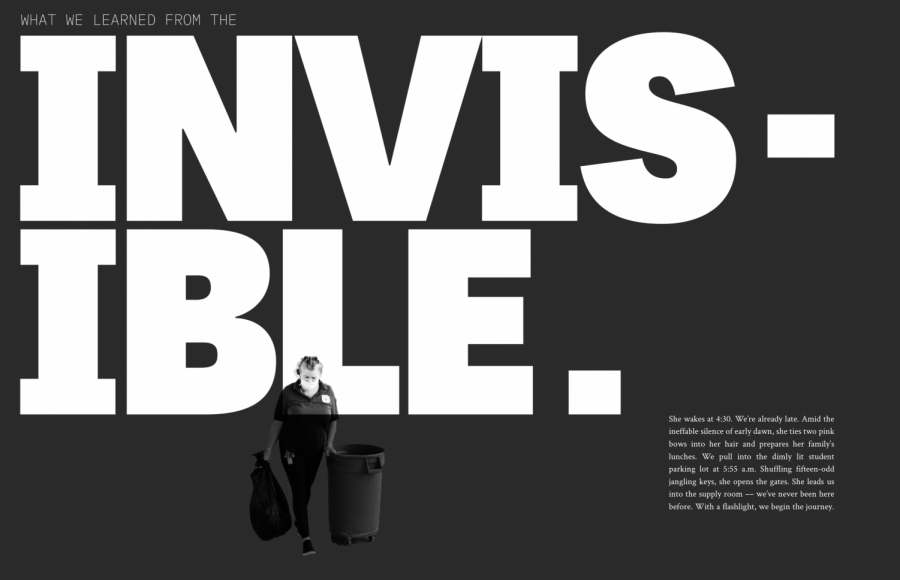




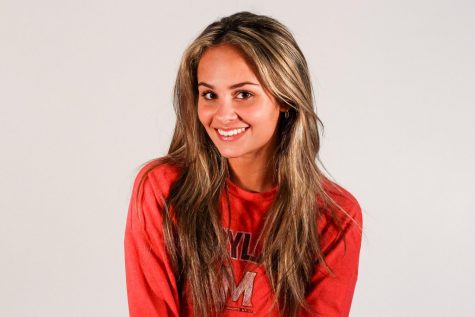
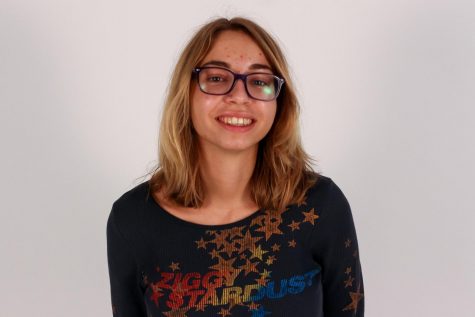
Gary Russo • Dec 21, 2020 at 12:38 pm
Beautiful article shining a light on our need to always look around us at the wonderful people in our world we never take the time to know or appreciate. So well written as the writers take you along with them on their interviewing journey as their own eyes are opened with the readers.
Alina Alonso • Dec 19, 2020 at 3:12 pm
You have no idea the impact you are making. Every segment of our society has millions of these unseen heroes hidden in the shadows outside the shinning lights of our glistening buildings, skyscrapers and corporate headquarters.
Then there are the agricultural workers who bring food to our tables. They too are unrecognized and taken for granted that they will always be there. Every single segment of our economy relies on these invisible human beings whose names and stories we do not know.
Thank you for telling the story.
Kaili Ziffer • Dec 17, 2020 at 6:03 pm
I alaways wanted the custodians to get the recognition they deserve thank you guys for making that happen! They are such hard workers and I am just amazed by their selflessness for the students and the planet.